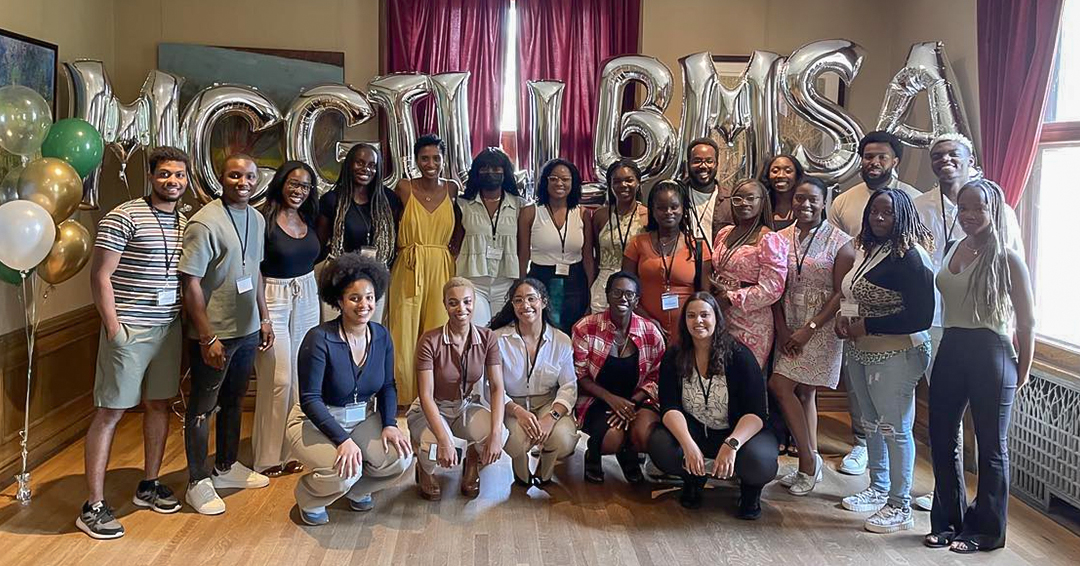
This April, the Black Medical Students’ Association of Canada (BMSAC) will host its Annual General Meeting in Montreal instead of in its usual Toronto location, in a nod to the organization’s growing Francophone membership. As part of its mission to dismantle barriers to equity, diversity and inclusivity, the McGill Department of Medicine (DoM) has taken on the role of a sponsor for the event. With February ushering in Black History Month, it’s important to reflect on the narratives, achievements, and aspirations of Black individuals within various spheres, including the field of medicine. At the Faculty of Medicine and Health Sciences (FHMS), the McGill Black Medical Students’ Association (BMSA) is a source of empowerment, advocacy, and community for its members. The DoM invited the McGill BMSA to introduce some of its members and share their aspirations for the association in the coming years.
 Khadija Brouillette is a second year medical student, Vice-President of McGill BMSA and the 2023-2024 Chair of the BMSAC. Her story begins in Ontario where she navigated an education system that inadvertently funnelled many Black students into “college” streams, limiting their career options from an early age. Reflecting on her journey, Khadija recognizes this as the beginning of a systemic issue: a leaky pipeline — an issue she is determined to address. As a member of the Black Health Innovation Collaborative, Khadija collaborates with McGill FMHS alumna Onye Nnoro, MDCM, CCFP, MPH, FRCPC and James R Johnston Chair in Black Canadian Studies at Dalhousie University’s Faculty of Medicine, OmiSoore Dryden, PhD, to develop educational resources addressing anti-Black racism.
Khadija Brouillette is a second year medical student, Vice-President of McGill BMSA and the 2023-2024 Chair of the BMSAC. Her story begins in Ontario where she navigated an education system that inadvertently funnelled many Black students into “college” streams, limiting their career options from an early age. Reflecting on her journey, Khadija recognizes this as the beginning of a systemic issue: a leaky pipeline — an issue she is determined to address. As a member of the Black Health Innovation Collaborative, Khadija collaborates with McGill FMHS alumna Onye Nnoro, MDCM, CCFP, MPH, FRCPC and James R Johnston Chair in Black Canadian Studies at Dalhousie University’s Faculty of Medicine, OmiSoore Dryden, PhD, to develop educational resources addressing anti-Black racism.
Rebecca Aberra (pictured above in the group photo, front row, far right), third year medical student and President of the McGill BMSA, embodies leadership and mentorship. As the Student Coordinator for the McGill Black Candidate Pathway at the FMHS Office of Social Accountability and Community Engagement, Rebecca helps equip Black learners who are applying to medicine through the pathway with essential tools and a wide range of support. By prioritizing mentorship, Rebecca actively contributes to overcoming barriers that hinder Black students’ progress in medicine, fostering a culture that promotes longterm success and diversity in the field.
 A member of the medicine Class of 2027, Amadou Houla, influenced by the positive impact of mentorship in his own life, found solace and support within the McGill BMSA community. Now, as a mentor himself, he “pays it forward”, creating a sense of belonging and solidarity for new students—an essential part of nurturing a supportive environment for Black learners.
A member of the medicine Class of 2027, Amadou Houla, influenced by the positive impact of mentorship in his own life, found solace and support within the McGill BMSA community. Now, as a mentor himself, he “pays it forward”, creating a sense of belonging and solidarity for new students—an essential part of nurturing a supportive environment for Black learners.
 Anikka Swaby, an MDCM-PhD student and the McGill BMSA’s Director of Finance, finds perseverance and innovation crucial to her pursuit of a career as a physician-scientist. With a research focus on the gut microbiome and cancer, Anikka’s academic pursuits exemplify her commitment to advancing scientific knowledge and improving healthcare outcomes. Beyond her thesis work, Anikka is actively involved in the BMSAC’s research committee, where she seeks to contribute to understanding the experiences of Black medical students in Canada guided by the vision for advancing health equity and driving positive change in healthcare.
Anikka Swaby, an MDCM-PhD student and the McGill BMSA’s Director of Finance, finds perseverance and innovation crucial to her pursuit of a career as a physician-scientist. With a research focus on the gut microbiome and cancer, Anikka’s academic pursuits exemplify her commitment to advancing scientific knowledge and improving healthcare outcomes. Beyond her thesis work, Anikka is actively involved in the BMSAC’s research committee, where she seeks to contribute to understanding the experiences of Black medical students in Canada guided by the vision for advancing health equity and driving positive change in healthcare.
McGill BMSA mission and initiatives
Diversity in medical education isn’t a buzzword—it’s a necessity. Representation matters, not only for the individuals being represented but also for the patients they serve. When patients see themselves reflected in their healthcare providers, they feel understood, valued and safe. Additionally, diverse perspectives in medical education enrich the learning experience, fostering a more comprehensive understanding of healthcare disparities and the systemic issues at play.
The accomplishments of McGill BMSA members, coupled with the commitment of McGill University’s FHMS, underscore the importance of creating pathways for underrepresented populations in Medicine. From the inception of the McGill Black Candidate Pathway to the ongoing efforts to uphold the BMSAC calls to action, strides are being made towards a more equitable and inclusive medical community.
Innovative projects and events spearheaded by McGill BMSA members further amplify their impact:
- The Inaugural Annual Welcome Event sponsored by the Cadet Foundation serves as a platform for connection and mentorship, fostering a sense of belonging among incoming students.
- Black Health Talk, held on February 21 in honour of Black History Month, facilitated discussions on the unique experiences and challenges faced by Black individuals in the medical field, promoting understanding and advocacy.
In conclusion, the McGill BMSA isn’t just a student organization—it’s a catalyst for change. It’s a testament to resilience, empowerment and solidarity within the medical community. As we celebrate Black History Month, let us honour the past, acknowledge the present and envision a future with diversity, equity, and inclusion.
